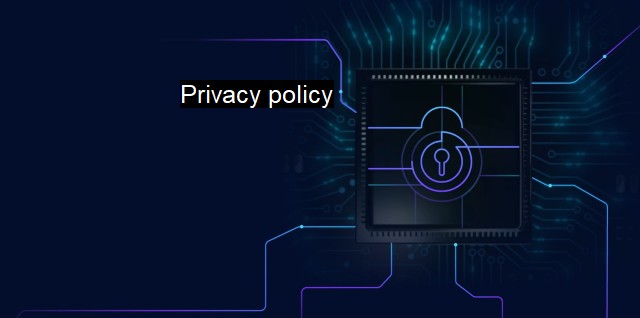What is Privacy policy?
Protecting Sensitive Information Online: A Guide to Understanding Privacy Policies for Individuals and Organizations
In today’s digital era, the privacy of the data belonging to both individuals and organizations online has become a major concern. "Privacy policy" refers to a set of regulations, statements, or principles that outline the way in which personal information belonging to individuals or organizations is collected, utilized, shared, and stored online. These regulations are formed as a countermeasure to protect individuals from harm and identity theft, safeguard business data processes and prevent fraud in cybercrime activity.Privacy policies are typically used on platforms that collect personal data such as social media platforms, eCommerce stores, mobile applications, and other digital services. Given the increasing number of online crimes affecting personal data, it is crucial for organizations and individuals to be aware of the importance of privacy policies to protect sensitive information like financial records, contracts, usernames, passwords, and other confidential pieces of data.
One of their primary advantages is that privacy policies help enhance transparency and openness by outlining how personal data is collected, stored, processed, or shared with third parties. One purpose of a privacy policy is to guarantee that individuals know how their privacy is treated or dealt with - this helps prevent users from falling victim to scams and data manipulation or from unintentionally providing sensitive personal data to phishers or hackers via suspicious interactions.
In essence, privacy policies facilitate fair data use, by enabling their enforcement and creating "good faith obligations" in contracts between digital service providers and web customers, subscribers, partners, or vendors. Privacy Policies, therefore, mitigate risks before they turn into data or cyber-security breaches, which can prove greatly harmful to commercial reputation and operational capacity.
In relation to cybersecurity practices, privacy protection measures primarily include Anti-virus, Endpoint Security Tools, and Firewall technologies used when exchanging and sharing files or sensitive data within a network. These measures facilitate data protection along the cybersecurity line while ensuring full compliance with relevant national and international cybersecurity laws. In fact, integrating effective data and privacy policies both address concerns and allows users to engage and participate in internet interactions with a greater sense of security knowing that their personal data is safeguarded by technical and administrative practices implemented by digital service providers.
That being said, ensuring proper documentation and regulative enforcement of modern-day privacy policies is not just a matter of improving firewall and antivirus. For instance, incorporating Human Resource policies is as important as technical or organizational policies to protect sensitive data from being physically lost or stolen.
An organisation can benefit from well-documented HR policies that emphasise adequate training to its workers to provide for a safety precaution public communication culture, emergency communication, and effective interdepartmental data/backups protocols. Also, forms of online safety regulations can incorporate “click-to-accept” agreements for individuals and businesses requesting access to new digital services especially institutions whose risk consequence could attract class-action cyber lawsuits for failure to safeguard sensitive information from insider dealing.
Privacy rules help to ensure that social and business interactions are secured from invasive tracking, recording and subversion into gray areas, thus promoting better digital interactivity, enterprise mobility, and employee-endowed data sensor awareness for cybersecurity prevention. Therefore, Privacy policies provide a useful foundation on which to build strong cyber security lead guaranteeing cyber safety maintenance thus exchanging digital credibility into more robust operational reputation than social media frontier privacy violations.

Privacy policy FAQs
What is a privacy policy?
A privacy policy is a legal document that outlines how a company collects, uses, and manages the personal information of its customers or users. It describes the measures in place to protect personal data and provides transparency to users about how their information is being used.Why is a privacy policy important for cybersecurity and antivirus?
A privacy policy is important for cybersecurity and antivirus because it outlines the ways in which personal data is protected. When users provide personal information such as names, addresses, and payment information, it is essential that they trust that their data is secure. A privacy policy sets forth this trust by outlining the measures in place to protect the data, reducing the risk of cyberattacks and fraud.What should be included in a privacy policy?
A privacy policy should include the types of data being collected, the methods of collection, the purposes of data usage, the parties who have access to the data, the security measures in place, and any third-party providers who may have access to user data. It should also detail any user rights regarding their data, including the ability to access, modify, or delete their information.What are the consequences of not having a privacy policy?
The consequences of not having a privacy policy can be severe, both in terms of legal and financial penalties and damage to reputation. Failing to protect personal data can result in costly data breaches, lawsuits, and loss of customer trust. Additionally, certain jurisdictions may require businesses to have a privacy policy, and failure to comply can result in fines or other legal action. External Resources
| | A | | | B | | | C | | | D | | | E | | | F | | | G | | | H | | | I | | | J | | | K | | | L | | | M | |
| | N | | | O | | | P | | | Q | | | R | | | S | | | T | | | U | | | V | | | W | | | X | | | Y | | | Z | |
| | 1 | | | 2 | | | 3 | | | 4 | | | 7 | | | 8 | | |||||||